by用法的练习题
- 格式:doc
- 大小:17.00 KB
- 文档页数:1
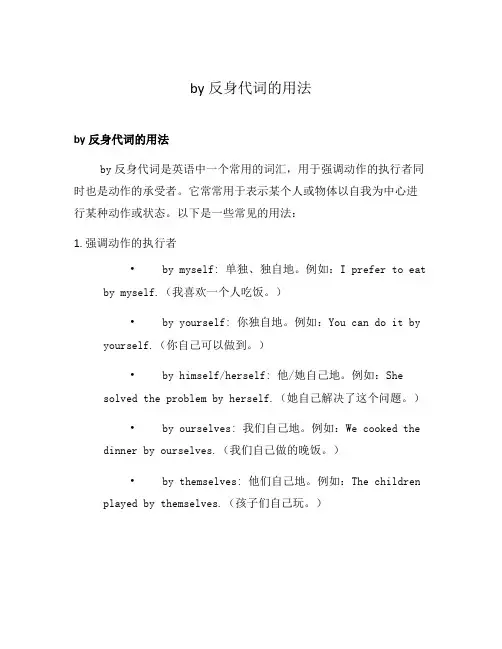
by反身代词的用法by反身代词的用法by反身代词是英语中一个常用的词汇,用于强调动作的执行者同时也是动作的承受者。
它常常用于表示某个人或物体以自我为中心进行某种动作或状态。
以下是一些常见的用法:1. 强调动作的执行者•by myself: 单独、独自地。
例如:I prefer to eat by myself.(我喜欢一个人吃饭。
)•by yourself: 你独自地。
例如:You can do it by yourself.(你自己可以做到。
)•by himself/herself: 他/她自己地。
例如:She solved the problem by herself.(她自己解决了这个问题。
)•by ourselves: 我们自己地。
例如:We cooked the dinner by ourselves.(我们自己做的晚饭。
)•by themselves: 他们自己地。
例如:The children played by themselves.(孩子们自己玩。
)2. 强调手段或方式•by hand: 用手。
例如:She wrote the letter by hand.(她亲手写了这封信。
)•by foot: 步行。
例如:They went to the park by foot.(他们步行去了公园。
)•by bike: 骑自行车。
例如:He goes to work by bike.(他骑自行车去上班。
)•by car: 乘车。
例如:I travel to the city by car.(我坐车去城市。
)•by plane: 乘飞机。
例如:They traveled to Europe by plane.(他们乘飞机去了欧洲。
)3. 强调方式或手段•by accident: 偶然地。
例如:He found the lost key by accident.(他偶然找到了丢失的钥匙。
)•by chance: 碰巧,偶然地。
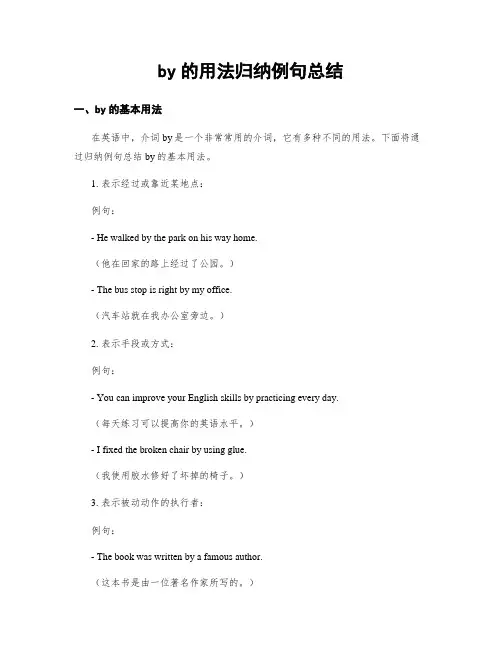
by的用法归纳例句总结一、by的基本用法在英语中,介词by是一个非常常用的介词,它有多种不同的用法。
下面将通过归纳例句总结by的基本用法。
1. 表示经过或靠近某地点:例句:- He walked by the park on his way home.(他在回家的路上经过了公园。
)- The bus stop is right by my office.(汽车站就在我办公室旁边。
)2. 表示手段或方式:例句:- You can improve your English skills by practicing every day.(每天练习可以提高你的英语水平。
)- I fixed the broken chair by using glue.(我使用胶水修好了坏掉的椅子。
)3. 表示被动动作的执行者:例句:- The book was written by a famous author.(这本书是由一位著名作家所写的。
)- The painting was created by an unknown artist.(这幅画是由一位未知艺术家创作的。
)4. 表示原因或理由:例句:- She didn't come to the party because she was busy with work.(她没来参加派对是因为工作太忙。
)- They canceled the trip due to bad weather conditions.(由于恶劣天气条件,他们取消了旅行计划。
)5. 表示按照顺序或标准:例句:- The students were ranked by their test scores.(学生们按照他们的考试成绩排名。
)- The books on the shelf are arranged by author's last name.(书架上的书是按照作者的姓氏进行排序的。
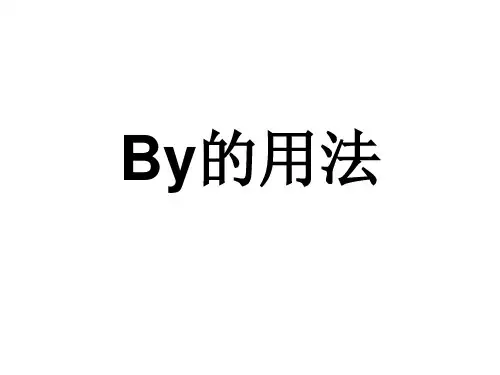
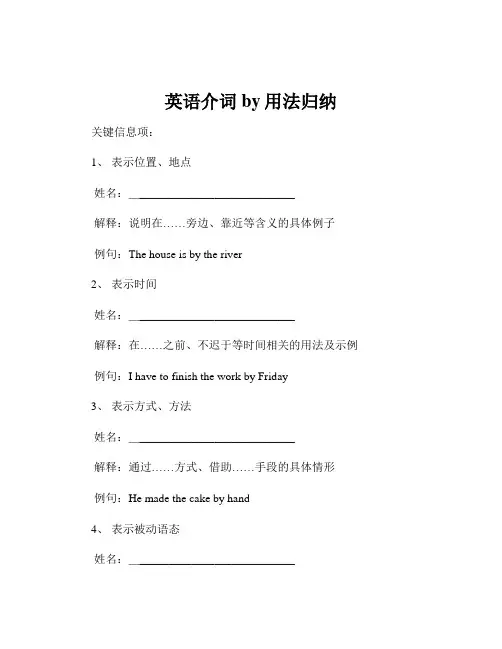
英语介词by用法归纳关键信息项:1、表示位置、地点姓名:____________________________解释:说明在……旁边、靠近等含义的具体例子例句:The house is by the river2、表示时间姓名:____________________________解释:在……之前、不迟于等时间相关的用法及示例例句:I have to finish the work by Friday3、表示方式、方法姓名:____________________________解释:通过……方式、借助……手段的具体情形例句:He made the cake by hand4、表示被动语态姓名:____________________________解释:在被动句中用于引出动作的执行者例句:The window was broken by Tom5、表示交通、运输工具姓名:____________________________解释:乘坐……交通工具的表述方式例句:I usually go to work by bus11 表示位置、地点By 用于表示位置或地点时,常常表示“在……旁边;靠近;沿着”等意思。
111 例如,“The chair is by the window”(这把椅子在窗户旁边。
)在这个句子中,by 明确指出了椅子与窗户的相对位置关系。
112 再比如,“There is a park by the school”(学校旁边有一个公园。
)这里的 by 强调了公园和学校的临近位置。
12 表示时间By 在表示时间时,有“在……之前;不迟于”的意思。
121 像“Please come back by six o'clock”(请在六点之前回来。
)这个句子中,by 设定了一个时间的上限。
122 又如,“You should hand in your homework by Monday”(你应该在周一之前交作业。
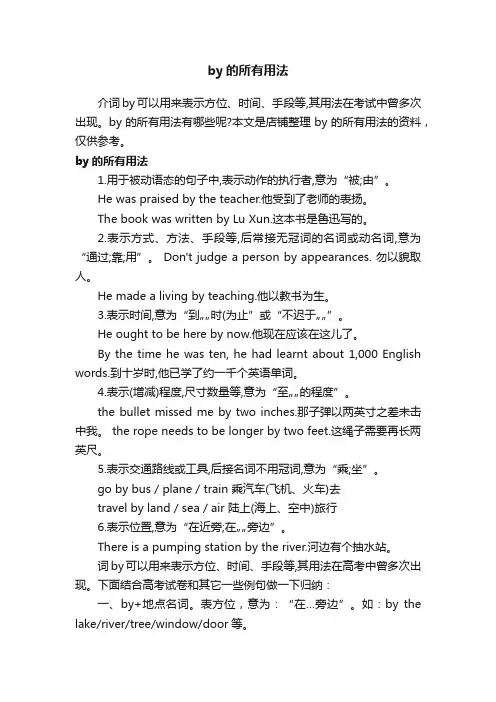
by的所有用法介词by可以用来表示方位、时间、手段等,其用法在考试中曾多次出现。
by的所有用法有哪些呢?本文是店铺整理by的所有用法的资料,仅供参考。
by的所有用法1.用于被动语态的句子中,表示动作的执行者,意为“被;由”。
He was praised by the teacher.他受到了老师的表扬。
The book was written by Lu Xun.这本书是鲁迅写的。
2.表示方式、方法、手段等,后常接无冠词的名词或动名词,意为“通过;靠;用”。
Don't judge a person by appearances. 勿以貌取人。
He made a living by teaching.他以教书为生。
3.表示时间,意为“到……时(为止”或“不迟于……”。
He ought to be here by now.他现在应该在这儿了。
By the time he was ten, he had learnt about 1,000 English words.到十岁时,他已学了约一千个英语单词。
4.表示(增减)程度,尺寸数量等,意为“至……的程度”。
the bullet missed me by two inches.那子弹以两英寸之差未击中我。
the rope needs to be longer by two feet.这绳子需要再长两英尺。
5.表示交通路线或工具,后接名词不用冠词,意为“乘;坐”。
go by bus / plane / train 乘汽车(飞机、火车)去travel by land / sea / air 陆上(海上、空中)旅行6.表示位置,意为“在近旁;在……旁边”。
There is a pumping station by the river.河边有个抽水站。
词by可以用来表示方位、时间、手段等,其用法在高考中曾多次出现。
下面结合高考试卷和其它一些例句做一下归纳:一、by+地点名词。
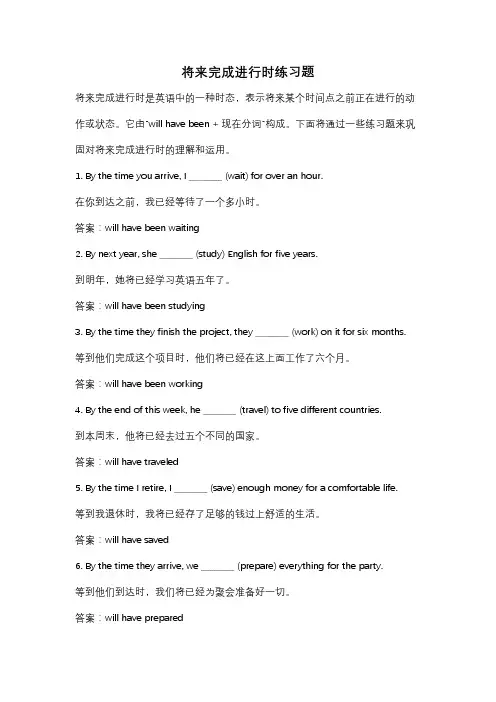
将来完成进行时练习题将来完成进行时是英语中的一种时态,表示将来某个时间点之前正在进行的动作或状态。
它由"will have been + 现在分词"构成。
下面将通过一些练习题来巩固对将来完成进行时的理解和运用。
1. By the time you arrive, I ________ (wait) for over an hour.在你到达之前,我已经等待了一个多小时。
答案:will have been waiting2. By next year, she ________ (study) English for five years.到明年,她将已经学习英语五年了。
答案:will have been studying3. By the time they finish the project, they ________ (work) on it for six months. 等到他们完成这个项目时,他们将已经在这上面工作了六个月。
答案:will have been working4. By the end of this week, he ________ (travel) to five different countries.到本周末,他将已经去过五个不同的国家。
答案:will have traveled5. By the time I retire, I ________ (save) enough money for a comfortable life.等到我退休时,我将已经存了足够的钱过上舒适的生活。
答案:will have saved6. By the time they arrive, we ________ (prepare) everything for the party.等到他们到达时,我们将已经为聚会准备好一切。
答案:will have prepared7. By next month, he ________ (live) in this city for ten years.到下个月,他将已经在这个城市居住十年了。
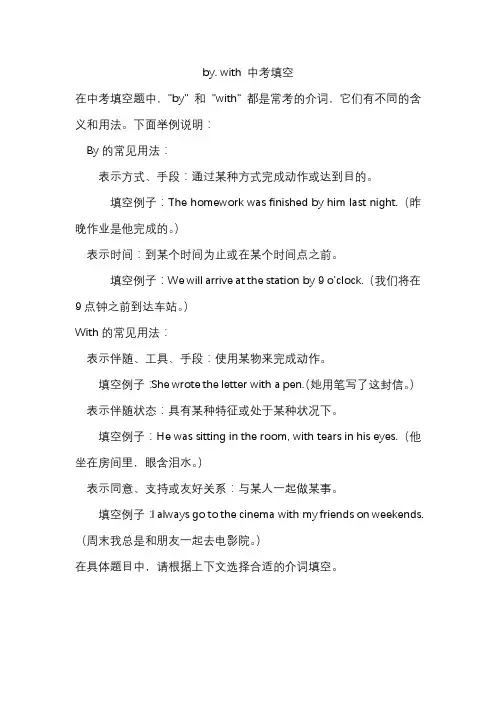
by. with 中考填空
在中考填空题中,"by" 和"with" 都是常考的介词,它们有不同的含义和用法。
下面举例说明:
By 的常见用法:
表示方式、手段:通过某种方式完成动作或达到目的。
填空例子:The homework was finished by him last night.(昨晚作业是他完成的。
)
表示时间:到某个时间为止或在某个时间点之前。
填空例子:We will arrive at the station by 9 o'clock.(我们将在9点钟之前到达车站。
)
With 的常见用法:
表示伴随、工具、手段:使用某物来完成动作。
填空例子:She wrote the letter with a pen.(她用笔写了这封信。
)表示伴随状态:具有某种特征或处于某种状况下。
填空例子:He was sitting in the room, with tears in his eyes.(他坐在房间里,眼含泪水。
)
表示同意、支持或友好关系:与某人一起做某事。
填空例子:I always go to the cinema with my friends on weekends.(周末我总是和朋友一起去电影院。
)
在具体题目中,请根据上下文选择合适的介词填空。
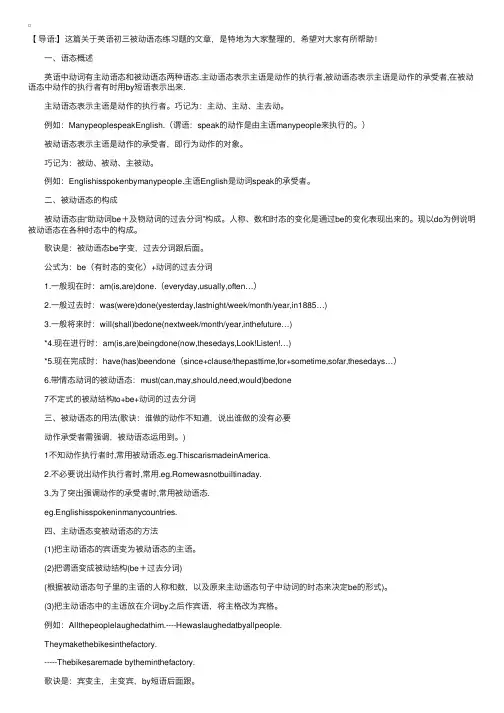
【导语:】这篇关于英语初三被动语态练习题的⽂章,是特地为⼤家整理的,希望对⼤家有所帮助! ⼀、语态概述 英语中动词有主动语态和被动语态两种语态.主动语态表⽰主语是动作的执⾏者,被动语态表⽰主语是动作的承受者,在被动语态中动作的执⾏者有时⽤by短语表⽰出来. 主动语态表⽰主语是动作的执⾏者。
巧记为:主动、主动、主去动。
例如:ManypeoplespeakEnglish.(谓语:speak的动作是由主语manypeople来执⾏的。
) 被动语态表⽰主语是动作的承受者,即⾏为动作的对象。
巧记为:被动、被动、主被动。
例如:Englishisspokenbymanypeople.主语English是动词speak的承受者。
⼆、被动语态的构成 被动语态由“助动词be+及物动词的过去分词”构成。
⼈称、数和时态的变化是通过be的变化表现出来的。
现以do为例说明被动语态在各种时态中的构成。
歌诀是:被动语态be字变,过去分词跟后⾯。
公式为:be(有时态的变化)+动词的过去分词 1.⼀般现在时:am(is,are)done.(everyday,usually,often…) 2.⼀般过去时:was(were)done(yesterday,lastnight/week/month/year,in1885…) 3.⼀般将来时:will(shall)bedone(nextweek/month/year,inthefuture…) *4.现在进⾏时:am(is,are)beingdone(now,thesedays,Look!Listen!…) *5.现在完成时:have(has)beendone(since+clause/thepasttime,for+sometime,sofar,thesedays…) 6.带情态动词的被动语态:must(can,may,should,need,would)bedone 7不定式的被动结构to+be+动词的过去分词 三、被动语态的⽤法(歌诀:谁做的动作不知道,说出谁做的没有必要 动作承受者需强调,被动语态运⽤到。
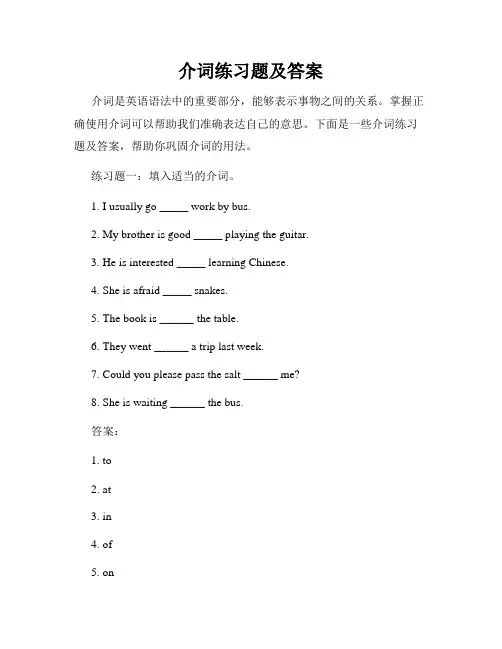
介词练习题及答案介词是英语语法中的重要部分,能够表示事物之间的关系。
掌握正确使用介词可以帮助我们准确表达自己的意思。
下面是一些介词练习题及答案,帮助你巩固介词的用法。
练习题一:填入适当的介词。
1. I usually go _____ work by bus.2. My brother is good _____ playing the guitar.3. He is interested _____ learning Chinese.4. She is afraid _____ snakes.5. The book is ______ the table.6. They went ______ a trip last week.7. Could you please pass the salt ______ me?8. She is waiting ______ the bus.答案:1. to2. at3. in4. of5. on7. to8. for练习题二:选择适当的介词填空。
1. She has been living in London ______ 2010.2. He walked ______ the street and entered the store.3. We celebrated his birthday ______ a surprise party.4. The ball rolled ______ the hill and into the river.5. They arrived ______ the airport just in time for their flight.6. The cat jumped ______ the table and knocked over a glass.7. The teacher asked the students to write ______ their names on the paper.8. She always dreams ______ becoming a famous singer.答案:1. since2. along3. with4. down5. at7. down8. of练习题三:根据句意,在括号中选择适当的介词填空。
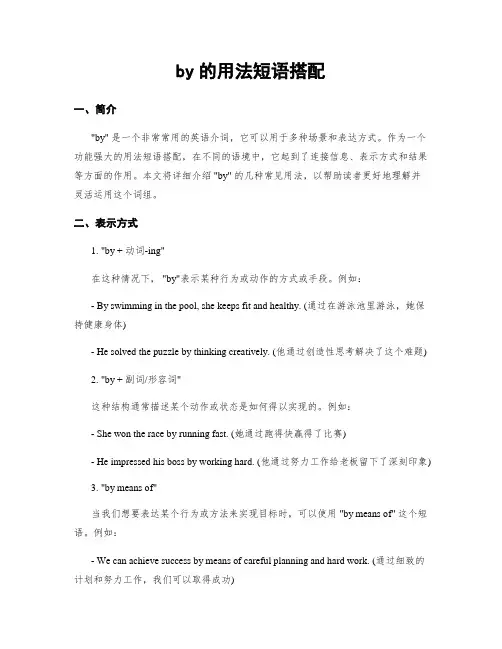
by的用法短语搭配一、简介"by" 是一个非常常用的英语介词,它可以用于多种场景和表达方式。
作为一个功能强大的用法短语搭配,在不同的语境中,它起到了连接信息、表示方式和结果等方面的作用。
本文将详细介绍 "by" 的几种常见用法,以帮助读者更好地理解并灵活运用这个词组。
二、表示方式1. "by + 动词-ing"在这种情况下, "by"表示某种行为或动作的方式或手段。
例如:- By swimming in the pool, she keeps fit and healthy. (通过在游泳池里游泳,她保持健康身体)- He solved the puzzle by thinking creatively. (他通过创造性思考解决了这个难题)2. "by + 副词/形容词"这种结构通常描述某个动作或状态是如何得以实现的。
例如:- She won the race by running fast. (她通过跑得快赢得了比赛)- He impressed his boss by working hard. (他通过努力工作给老板留下了深刻印象)3. "by means of"当我们想要表达某个行为或方法来实现目标时,可以使用 "by means of" 这个短语。
例如:- We can achieve success by means of careful planning and hard work. (通过细致的计划和努力工作,我们可以取得成功)- He solved the problem by means of advanced technology. (他通过先进的技术解决了这个问题)三、表示结果1. "by + 名词/代词"在这种结构中, "by" 表示某个行为或手段导致的结果。
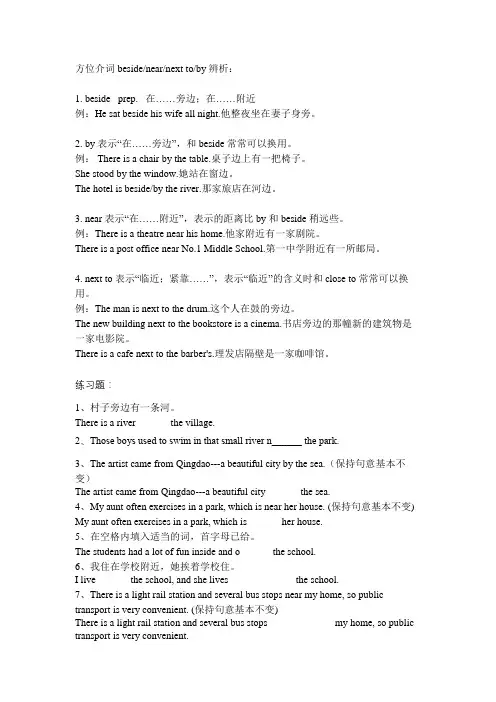
方位介词beside/near/next to/by辨析:1. beside prep. 在……旁边;在……附近例:He sat beside his wife all night.他整夜坐在妻子身旁。
2. by 表示“在……旁边”,和beside常常可以换用。
例: There is a chair by the table.桌子边上有一把椅子。
She stood by the window.她站在窗边。
The hotel is beside/by the river.那家旅店在河边。
3. near 表示“在……附近”,表示的距离比by和beside稍远些。
例:There is a theatre near his home.他家附近有一家剧院。
There is a post office near No.1 Middle School.第一中学附近有一所邮局。
4. next to 表示“临近;紧靠……”,表示“临近”的含义时和close to常常可以换用。
例:The man is next to the drum.这个人在鼓的旁边。
The new building next to the bookstore is a cinema.书店旁边的那幢新的建筑物是一家电影院。
There is a cafe next to the barber's.理发店隔壁是一家咖啡馆。
练习题:1、村子旁边有一条河。
There is a river ______ the village.2、Those boys used to swim in that small river n______ the park.3、The artist came from Qingdao---a beautiful city by the sea.(保持句意基本不变)The artist came from Qingdao---a beautiful city ______ the sea.4、My aunt often exercises in a park, which is near her house. (保持句意基本不变) My aunt often exercises in a park, which is ______ her house.5、在空格内填入适当的词,首字母已给。
介词by的用法本单元by + v.-ing结构是一个重点,该结构意思是“通过……,以……的方式”,后面常接v.-ing 形式,表示“通过某种方式得到某种结果”,即表示行为的方式或手段。
I practice speaking English by joining an English-language club.我通过加入一个英语语言俱乐部来练习讲英语。
Mr Li makes a living by driving taxis.李先生靠开出租车为生。
介词by + v.-ing 结构常用来回答How do you...?或How can I...?之类的问题。
—How do you learn English? 你怎样学习英语呢?—I learn English by reading aloud. 我通过大声朗读来学英语。
—How can I turn on the computer? 我怎样才能打开电脑呢?—By pressing this button. 按这个按钮。
[相关链接]by 是个常用介词,其他用法还有:①表示位置,意思是“在……旁边”,“靠近……”,有时可与beside互换。
The girls are playing by (beside) the lake.女孩们正在湖边玩。
此时要注意它与介词near有所不同,即by 表示的距离更“近”。
比较:He lives by the sea. 他住在海滨。
He lives near the sea. 他住在离海不远处。
②表示交通方式,意为“乘坐”,后接表示交通工具的名词(如bus, bike, train, plane, car, taxi, ship等)或与交通工具密切相关的名词(如air, water, land, road等),在句中主要用作方式状语,其中通常不用冠词或其他限定词。
Jim often goes to work by bike.吉姆常骑自行车上班。
by的练习题By的练习题By是一个常用的介词,用来表示某种方式、方法、手段。
在英语中,掌握好by 的用法对于提高语言表达能力至关重要。
下面我们来进行一些关于by的练习题,帮助大家更好地理解和运用这个介词。
1. 填空题a) I usually go to work _____ bus.b) She solved the problem _____ asking for help.c) He made a living _____ playing music on the street.d) They communicated with each other _____ writing letters.e) We can learn a lot _____ reading books.2. 选择题a) How did you get here?1) By walking.2) On walking.3) With walking.b) She learned French _____ watching French movies.1) by2) for3) fromc) We can express our ideas _____ speaking out.1) by2) in3) withd) He earned a scholarship _____ his outstanding academic performance.1) by2) at3) fore) They traveled around the world _____ backpacking.1) by2) on3) with3. 改错题a) I usually go to school by walk.b) She solved the puzzle by using her intelligence.c) He made a living by playing music in the streets.d) They communicated with each other by write letters.e) We can learn a lot by read books.解析:1. a) by:表示通过某种交通方式进行行程,这里表示“乘坐公交车”。
by的用法及固定搭配一、By的基本含义和用法By是一个常用的英语介词,在句子中有多种含义和用法。
它可以表示行为的方式、方法、手段或工具,并常与动词原形连用,构成短语或固定搭配。
本文将重点介绍By在这方面的应用。
1. By作为手段或方法:By可以表示某种实现某目标或完成某事情的方法或手段。
例如:- You can improve your English by practicing speaking with native speakers.(你可以通过与母语为英语的人练习口语来提高你的英语水平)- We can solve the problem by working together.(我们可以通过共同努力来解决问题)2. By表示交通工具:当谈论到旅行或移动时,By也常用来表示所使用的交通工具。
例如:- I usually go to work by bus.(我通常坐公交车去上班)- He traveled to Europe by plane last year.(去年他坐飞机去了欧洲)3. By表示身份或条件:By有时可用来表达某人或某物特定的身份、条件或状态。
例如:- I am a teacher by profession.(我职业是教师)- She is just an ordinary citizen by birth, but she has achieved extraordinary things in her life.(她只是个普通市民,但她在生活中取得了非凡的成就)二、By的固定搭配及用法1. By the way这是一个常用的短语,可用于在交谈中引入新话题或提出附加问题。
它也可以作为一种修辞手法,插入一些与主题相关但与正文内容相对次要的信息。
例如:- I heard that you are studying abroad in England. By the way, have you visited London yet?(我听说你在英国留学。
by 介词的用法归纳嘿,同学们!今天咱们来好好聊聊“by”这个介词的用法。
我先给大家讲个我自己遇到的小事儿。
有一次我出去旅行,在一个小镇上,我想找一家特别的咖啡店。
我一路走啊走,问了好多路人,最后终于在一条安静的小巷子里找到了。
那家咖啡店的招牌上写着“Found by chance”(偶然被发现)。
当时我就想,这“by”用得可真妙!咱们先来说说“by”表示“通过……方式、手段”的用法。
比如说,“I learn English by reading books”(我通过读书来学习英语。
)这里的“by”就指出了学习英语的方式是读书。
再比如,“He made a living by selling flowers”(他靠卖花谋生。
)“selling flowers”就是他谋生的手段啦。
“by”还能用来表示“在……旁边”。
“The dog is sitting by the door”(这只狗正坐在门边。
)想象一下那只乖乖的小狗,安安静静地待在门边,是不是画面感一下子就有了?“by”表示“截止到……时间”的时候也很常见。
“I have to finish my homework by six o'clock”(我得在六点前完成作业。
)一想到快到截止时间作业还没写完,是不是心里有点小紧张?还有哦,“by”在被动语态中也经常出现。
“The book was written by him”(这本书是他写的。
)这里的“by”就表明了动作的执行者。
咱们再回到最开始我找咖啡店的事儿。
我能找到那家咖啡店,也算是“by luck”(靠运气)啦。
在学习“by”的用法时,大家可别死记硬背,要多结合具体的句子和语境去理解。
多做些练习题,比如用“by”来造几个句子,像“I go to school by bike”(我骑自行车去上学。
)或者“He solved the problem by himself”(他自己解决了这个问题。
初三英语by的用法练习题1. Fill in the blanks with the appropriate form of "by".a) We will arrive _________ train.b) They sent the package _________ courier.c) The book was written _________ a famous author.d) The message was delivered _________ a messenger.e) He fixed the computer _________ himself.2. Rewrite the following sentences using "by" to indicate the doer of the action.a) My homework was completed by me.b) The cake was baked by my mom.c) The car was repaired by the mechanic.d) The letter was written by Sarah.e) The house was cleaned by the maid.3. Choose the correct preposition (by, beside, next to, near) to complete each sentence.a) The park is _________ the library.b) She sits _________ me in class.c) The store is _________ the bank.d) The restaurant is _________ the cinema.e) The hotel is _________ the beach.4. Complete the following idiomatic expressions using "by".a) Don't judge a book _________ its cover.b) You can't buy happiness _________ money.c) He talks _________ himself all the time.d) She lives _________ herself in a small apartment.e) They won the game _________ a narrow margin.5. Use "by" to complete the following sentences about means of transportation.a) I prefer to travel _________ train.b) He flew to Paris _________ plane.c) They went sightseeing _________ boat.d) She likes to ride her bike _________ school.e) We traveled to the island _________ ferry.6. Choose the correct preposition (by, with, on) in the sentences below.a) He mended the chair _________ a hammer.b) He cut the bread _________ a knife.c) She combed her hair _________ a brush.d) They unlocked the door _________ a key.e) He fixed the bike _________ a wrench.7. Rewrite the following sentences using "by" to show the instrument or tool used.a) I cleaned the floor with a mop.b) He opened the can with a can opener.c) The picture was hung on the wall with a nail.d) She cut the paper with scissors.e) He painted the wall with a paintbrush.8. Fill in the blanks with the appropriate form of "by" to indicate the agent of the action.a) The window was broken _________ the bird.b) The vase was knocked over _________ the cat.c) The box was opened _________ the child.d) The cake was eaten _________ the guests.e) The car was scratched _________ the bicycle.9. Use "by" to complete the following sentences about time.a) The train will arrive _________ 6 o'clock.b) The meeting will start _________ noon.c) They usually have dinner _________ 7 p.m.d) The movie will begin _________ 9:30 p.m.e) He wakes up _________ sunrise.10. Rewrite the following sentences using "by" to indicate the manner of doing something.a) She spoke quietly.b) They walked slowly.c) He ate quickly.d) They danced gracefully.e) The dog barked loudly.答案:1. a) by, b) by, c) by, d) by, e) by2. a) I completed my homework.b) My mom baked the cake.c) The mechanic repaired the car.d) Sarah wrote the letter.e) The maid cleaned the house.3. a) next to, b) beside, c) near, d) by, e) near4. a) by, b) with, c) about, d) by, e) by5. a) by, b) by, c) by, d) to, e) by6. a) with, b) with, c) with, d) with, e) with7. a) I cleaned the floor by using a mop.b) He opened the can by using a can opener.c) The picture was hung on the wall by using a nail.d) She cut the paper by using scissors.e) He painted the wall by using a paintbrush.8. a) by, b) by, c) by, d) by, e) by9. a) by, b) at, c) at, d) at, e) at10. a) She spoke by whispering.b) They walked by taking slow steps.c) He ate by swallowing quickly.d) They danced by moving gracefully.e) The dog barked by making a loud sound.。
(英语)中考英语介词的基本方法技巧及练习题及练习题(含答案)一、初中英语介词1.Let's put the piano over there, __________ the wall.A. aboveB. againstC. acrossD. around【答案】 B【解析】【分析】句意:让我们把钢琴放在那边,靠着墙摆放。
A. above在……正上方;B. against紧靠;C. across穿过,横穿;D. around围绕,在附近。
结合Let's put the piano over there可知此处是说钢琴的位置,钢琴只能靠着墙摆放,故选B。
【点评】此题考查介词辨析。
2.Let's take a walk ________ the river after diner, shall we?A. alongB. throughC. uponD. over【答案】 A【解析】【分析】句意:让我们晚饭后沿着河流散步吧,好吗?A.沿着;B.穿过;C.根据;D.在......正上方。
根据常识可知沿着河流散步,along the river,沿着河流,固定搭配,故选A。
【点评】考查介词辨析,注意平时识记其词义,理解句意。
3.The high-speed train Qingdao and Beijing travels faster now. The train ride takes only about three hours.A. fromB. amongC. inD. between【答案】 D【解析】【分析】句意:现在青岛和北京之间的高速列车跑得更快了。
火车车程只有大约三个小时。
from 从;among 在……中;in 在……里;between 在……之间;根据后面的and,可知是固定搭配,between…and…,在……和……之间,故选D。
【点评】此题考查介词辨析。
by用法的练习题
by用法的练习题
e and sit ____ (我旁边).
2.There is a big tree (在河边).
3. (到上星期日)I had finished the book.
4.Can you finish the work (在五点之前).
5.Her mother goes to work bus every morning.
A.by
B.at
C.take
D.on
6.She came home _____ (乘飞机).
7.Did you make the desk (自己独自)?
8.She made a meal for her parents (独自)for the first time.
9. (顺便问一下)how many people are there in your family?
10.You should know her (逐渐地).
11.Ice has been turned into water (受热).
12. (不久以后)more and more people began to study English .
13.he Great Wall was built (用手).
14. He makes a living (通过教书).
15.-How do you learn English?
-I learn English (通过向老师请教的方式).
used to 相关用法的练习题
一、翻译
1.我妈妈习惯早起。
2.王先生曾经是一位工人。
3.他过去常常骑自行车上学。
二、用所给单词的适当形式填空:
1.We used to ___ (go )swimming last year.
2.I am used to ____(run)every morning.
3.Bamboos are used to ___(build) houses there.
4.They have been used to ______(live ) in the countryside.
三、根据汉语意思完成句子:
1.I _________________the food here.(我习惯于吃这儿的食物。
)
2.Tom_____________here.(汤姆曾在这儿住过。
)
3.I ___________in the river when I was a child.(我小时候常常去河里游泳。
)
4.Wood _____________paper. (木头可以用来造纸。
)
1.Chinese people keep pig for food , but now some people keep them as pets.
ed to
B.has to C had better
2.
1 / 1。